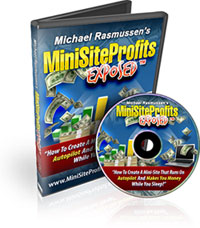If you regard your site as a whole, you must first consider that there is more than one kind of link, and you must understand the relevance of each type of link. You have navigation links leading visitors between the various pages on your website. Some links might be on every page, and others not, but do you know what should and should not be on every page? Then you have product links, which lead prospective buyers to the products you are advertising. Where do these links lead?
Good mutual reciprocal links may help you to improve your site rank in the search engines, while bad links or over-flooded links may ruin your site ranking. The good ranking also needs a good content apart from the links, so make sure you have quality content along with the quality links
Do they lead to another page on your website, or do they lead the visitor away and on to another person’s website? In other words an affiliate merchant’s page. If so, have you checked how easy it is for your visitor to get back to your website? Are they now lost for ever? What if your link leads to an information page? Some people offer links to such sites as Wikipedia or other such sites. Now are you confident that you know how to use links on your web site? Perhaps now you realise that you need some help or advice!
Be selective about the sites from which you request links. Search engines use sophisticated rules when judging the importance of a link, and the popularity of the site linking to you is a key criteria. One link from a high Ranking site is worth far more than a link from a personal web site.
Below are a few major things to keep in mind when exchanging links:
1. Relevant : The sites with who you exchange links with should be extremely relevant to your site.
2. Good Content : Websites should be unique in addition to having good content which is relevant too.
3. Selective : Websites should not have more than 20 links on that particular page on which your link will be shown.
4. Anchor Text :Your links title ought to be followed by a meaningful and positive site description
5. Link Manually : Attempt to avoid linking through software it will be better if performed manually
6. Be Descriptive:Your links anchor text ought to be a little bit descriptive in stead of merely containing a single keyword.
7. SE. Friendly : The link page ought to be indexed in Google and in all additional major search engines too.
8. Navigation : The link should directly go to your site in stead of through any extra redirection technique.
Avoid flooding your sites with reciprocal links - Many a times, having lots of links may hamper your site's credibility and the focus of the site visitor. The reciprocal links look good and attracts the site visitor when it maintains the navigation ease. But, if the site is flooded with links, it can hamper the 'stick to the content' quality, and thus, harming the site's popularity.

Use free tools for links exchange - Using free tools for link exchange can help you to get into the proper traffic. So, use free tools for your links exchange and make sure they are providing you good links.
Regards
Alan
Working From Home



 My StumbleUpon Page
My StumbleUpon Page


1 comment:
Hi Alan, this is really good advice. Many bloggers are still unaware of "do" and "don't" in reciprocal links,
Keep up the good works.
Jonathan Haryanto
http://jonathan-haryanto.blogspot.com/
http://www.SpeedyOnlineProfit.com
Post a Comment